
Today I pray for my friend, accepting that so much is a mystery, believing that God is with her and with me, and knowing that is it of the good.
| A Prayer Diary |
|
 My best friend is having a shoulder replacement today. It may be happening right now. I have asked friends to pray for her . I know they are and I know their prayers will make a positive difference. The mystery of faith, however, is that I don't know what that positive difference will be. It may be just what I want--ease, no pain, a quick recovery. But it may mean something else. The mystery is that we don't know, the faith is that we believe it will be for the good. Even when things happen which are obviously not good in any of my usual ways, I try to turn to God and see, hear, touch, taste, and smell what God is offering me, which I believe is of the good. Today I pray for my friend, accepting that so much is a mystery, believing that God is with her and with me, and knowing that is it of the good.
0 Comments
 There is a great deal to say about prayer; there is very little to say about prayer. Both are true! Sometimes when I start writing for this blog, I tell myself, “Oh, come on, you’ve said that before. They know that!” So why do I even continue? Why not add to ‘daily quotes’ and ‘word & image’ and leave it at that? Because, I’m still pondering this God mystery, this prayer mystery. I say the Jesus Prayer; I accept that prayer makes a difference, that God loves everyone, that my life is grace-filled, that our faith deepens when we read and ponder scripture, that I am called to pray for people…. But all those come from my mind. The prayer challenge is for them to move to my heart, which is where prayer is, where God is, where love resides and where it can rise for others to feel.  Every so often I get thinking about sacrifice, and what that means for me as a Christian. For the most part I hate the word because it brings up the idea that I have to give up something. Although I might not like it, I understand that sacrifice might include giving up some, or even all, of my possessions and privileged life style. Giving up who I am, however, or what I think I need in order to be who I am….Well, that does sit right. But what if sacrifice isn’t what I do, but who I am, as Rabbi Abraham Joshua Heschel suggests? “We do not sacrifice. We are the sacrifice.” When I think of it that way, so much changes. I start with who I am and from there I choose to do. I also noticed that my prayer for others becomes a lifting up to God, not a responsibility of mine to get it right. Being sacrifice is what Jesus calls us to be. 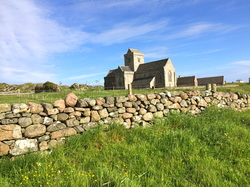 In the past two days I have had conversations with several women. Some staying at my hotel, others after services at the Abbey, and a few on my walks about the island. On Iona, because it is assumed that we are all Christian, it is acceptable to talk openly about our faith. This is rare to me; I like it, and I am sad that I don’t have more extensive faith conversations with Christians in my life. Why not, I ask myself? Much of it has to do with the fact that I live in New England, where people rarely talk about their faith and hardly ever in spiritual language. After all, we are an intellectual, liberal group. I believe this shuts us down and shuts us up. We don’t want to be misinterpreted or, worse still, be thought of as stupid. We New Englanders, after all, and have been acculturated since birth to keep our faith in church on Sunday and to give God no credit for leading us in good works. We do not dare open our faith-filled mouths for fear that we will be considered ‘one of those’ who are not members of the regional educated, liberal club of the northeast. I don’t know how to break this description, this persona that we Christians and non-church goes have created and continue to shared together? 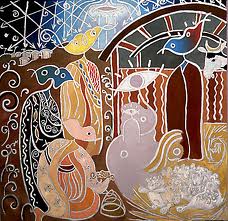 Every year of life waxes and wanes. Every stage of life comes and goes. Every facet of life is born and then dies. Every good moment is doomed to become only a memory. Every perfect period of living slips through our fingers and disappears. Every hope dims and every possibility turns eventually to dry clay. Until Christmas comes again. Then we are called at the deepest, most subconscious, least cognizant level to begin once more to live newly again. Christmas brings us all back to the crib of life to start over: aware of what has gone before, conscious that nothing can last, but full of hope that this time, finally, we can learn what it takes to live well, grow to full stature of soul and spirit, get it right. There is a child in each of us waiting to be born again. It is to those looking for life that the figure of the Christ, a child, beckons. Christmas is not for children. It is for those who refuse to give up and grow old, for those to whom life comes newly and with purpose each and every day, for those who can let yesterday go so that life can be full of new possibility always, for those who are agitated with newness whatever their age. Life is for the living, for those in whom Christmas is a feast without finish, a celebration of change, a call to begin once more the journey to human joy and holy meaning. Joan Chittister from In Search of Belief [email protected]  I love the peace and quiet and the fog here at the cottage his morning as I sit here, feeling the pain of so many. A friend's son took his life; another friend's son is in a mental institution so he won't, a young mother I know has died of cancer, leaving a husband and their five year old daughter; a friends infant granddaughter is experience medical complications; and then there are all the issues of poverty, war, the earth. What to do? It’s hard to put this into words, but I feel that my job/calling is to hold (in prayer) the pain for these people and situations. Mysteriously, all of this is pain is lifting me somewhere else. Closer to God? (I’m not certain if that’s the way to frame it, but it’s the best I can do at the moment.) With this prayer call I’m shifting from a mental ‘I’m sorry’ to a pain, ache, an experience of the heart. Prayer is no longer something I do mentally as much as something I feel compassionately. The sadness is intense, settled in deep in my being, not in my head. Yesterday I had a fear that it would overwhelm me toward depression; today it is settling in as a given for me by God. It’s very personal. Yesterday I wanted to share it with someone, some spiritual director or spiritual friend; today I’m fine sharing it with God (and on this blog).  I’m at the cottage, so grateful to wake up in this sacred place; the silence, solitude and simplicity is palpable. I arose at 5:15 and sat of the deck (living room) for almost two hours, just being in God’s presence as it washed over me—it remains with me still. I am blessed to be here with no obligations other than to take care of myself in the most rudimentary ways--eat, sleep and be safe. But blessings are not to be coveted or selfishly held, and so I know I have another obligation, one that God has given me, and that is to pray for others. When I am here, it is easier for me to clear out the cobwebs of chatter, judgment, critique and analysis that get in the way of being with God. When I am here, the space between God and me (and others) is transparent, and that, I believe is when prayer is heard and answered. Prayer, God, faith, hope, all such mysteries, and yet today I sense I have a handle on it all. I am especially praying for a friend whose son just took his life, and for a few others who are walking a precarious road. I know that my prayers are being heard and answered. ‘Very grateful.’ 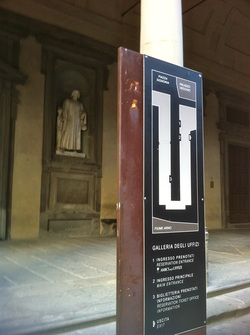 Fra Angelico Fra Angelico An early morning (8:15) return to the Uffizi. With my pass I was the first one into The Rooms, the 13th and 14th century rooms, that is. Today’s mission: study Mary’s pose in annunciation scenes. Michael Baxandall, in Painting & Experience in Fifteenth-Century Italy, describes “five successive spiritual and mental conditions or states attributable to Mary,” with disquiet and submission being the most common. 1. Disquiet 2. Reflection 3. Inquiry 4. Submission (humility) 5. Merit In disquiet, Mary has just heard the news. More specifically, she may show that she is reflecting on it; or maybe she is inquiring, as in Luke’s gospel, “How can this be…?” Regardless, her hands are outstretched in these first three states.. in submission, however, Mary’s hands across her breast, indicating that she has accepted God’s call to bear the Son of God and that the spirit has entered her. In the fifth state, she is alone on her own merit, without Angel Gabriel. The annunciation is over. Although the Renaissance painter followed certain standards that were subjected to the interpretation of the viewer, everyone knew the general rules. As I wandered the Uffizi this morning, did I observe Mary’s disquiet in Botticelli? Was Leonardo depicting an inquiring Mary? Is disquieted the best way to interpret Simone Martini’s Mary? I’ll have to go back to the Convent of San Marco and Fra Angelico’s Annunciation to find the most submissive Mary I know.
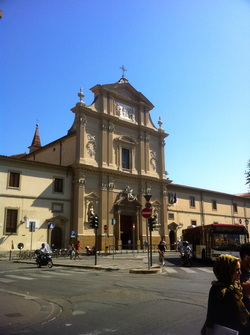 I am continually in awe when I visit the Convent of San Marco. My favorite place in all of Florence; an icon of 15th century Florentine Renaissance history, art and faith. Sitting in the inviting cloister offers plenty of solace. But then, there is the breath-taking approach at the head of the staircase leading to the Upper Floor. The Annunciation. An ‘aesthetic experience’, for sure. I spent a long time in front of this fresco this morning. It’s always been a favorite because I can’t help but look at it and wonder what God is calling me to do. And then there is the humility that Mary exudes, which I can almost feel within my reach. If this isn’t enough, walk down the corridors and peak into the dormitory cells, each with a fresco by Fra Angelico depicting a scene from the life of Christ. If only I could live there, I would pick Cell 1--Noli me tangere, with Jesus telling Mary Magdalene, “Do not to touch me, for I am not yet ascended to the Father.” I love the colors and the composition, and I have always been mystified by Jesus’ comment, for I often feel an approach-avoidance with Jesus. But here is a direct rebuff. It is a seminal moment. Mary has to wait until Jesus ascends, and when he does, Mary becomes all of us, and Jesus becomes accessible to us all.
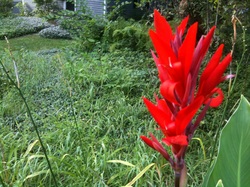 Mary Luti posted this today on Stillspeaking Devotional [email protected]. So powerful, so thought-provoking. Too powerful? Too thought-provoking? It leads me to a new level of faith where I may not want to go. You Do Not Answer, by Mary Luti "Why have you forsaken me? I cry by day, but you do not answer; and by night, but find no rest." - Psalm 22 Sometimes we think that if we work hard at our spiritual practices we are bound to experience God, to feel God within us. But not everyone feels God, no matter how hard they try or how much they want to. Many know only the ache of absence. The truth is that God is often silent, dark, and distant — so much so that it can be painful to be around people for whom God is cheerful, close, and chatty. There's an old slogan that says, 'If God feels far away, guess who moved?' You're supposed to answer, 'Not God.' But whoever thought that up never read the psalms. Jesus, who probably loved saying "Surely goodness and kindness will follow me all the days of my life" as much as we do, didn't pray Psalm 23 on the cross. He prayed Psalm 22: "I cry to you, but you do not answer. "You know this, but hear it again: the Christian life isn't about feeling feelings or acquiring spiritual experiences. Baptism ushers us into a life of greater depth than that — a life of faith. And faith is almost always a journey through the desert and the dark. If Deus absconditus is your God, you are not a second-class Christian. You have a gift. A hard one, but a gift all the same. Your heartache — faith's heartache — can lead you straight to the heartache of others, to neighbors whose abandonment is human, not divine. With them you can keep company. With them, mourn. With them, persevering, wait out the darkness 'till the Coming Day. Was there really anything else you wanted when once upon a time you said yes to a fierce and mysterious God? "Prayer: Hidden One, they say you are still speaking, and even if it isn't to me right now, give me faith to trust that you are as real as the poor, as close as the suffering, as audible as the cry of the abandoned; and let me find you there." About the Author Mary Luti is Visiting Professor of Worship and Preaching at Andover Newton Theological School. |
Contact me
[email protected] Archives
August 2023
Categories
All
|